Meet our 2024 Annual Conference Speakers!
 KEYNOTE: Camille Dungy, Author of Soil: The Story of a Black Mother’s Garden
KEYNOTE: Camille Dungy, Author of Soil: The Story of a Black Mother’s Garden
Camille T. Dungy is the author of Soil: The Story of a Black Mother’s Garden (Simon & Schuster: May 2, 2023). She has also written Guidebook to Relative Strangers: Journeys into Race, Motherhood, and History, a finalist for the National Book Critics Circle Award, and four collections of poetry, including Trophic Cascade, winner of the Colorado Book Award.
 KEYNOTE: Rebecca McMackin, Biodiversity for the Masses: Ecological Horticulture in the Anthropocene
KEYNOTE: Rebecca McMackin, Biodiversity for the Masses: Ecological Horticulture in the Anthropocene
Rebecca McMackin, is an ecologically obsessed horticulturist and garden designer. She is currently the Arboretum Curator of Woodlawn Cemetery, after completing the Loeb Fellowship at the Harvard Graduate School of Design. Prior to this, she spent a decade as Director of Horticulture of Brooklyn Bridge Park, where she managed 85 acres of diverse parkland organically. Their research into cultivating urban biodiversity and ethical management strategies has influenced thousands of people and entire urban parks systems to adopt similar approaches.
 Jazmin Albarran, Seeding the Future of the Horticulture Industry
Jazmin Albarran, Seeding the Future of the Horticulture Industry
Jazmin joined Seed Your Future as Executive Director with over a decade of change and systems management experience. With a solid knowledge of associations and philanthropy, she brought her skills and expertise in planning, leading, and managing development projects and programs to the movement. She has experience in a broad range of nonprofit organizations, including those focused on crisis support, youth development, and workforce development.
Jazmin will lead Seed Your Future’s next phase of growth, promoting horticulture, floriculture, and agriculture, and the nationwide expansion of career development opportunities with plants.
 Kathleen Salisbury, Silver Linings and Lemonade: An Arboretum Post-Natural Disaster
Kathleen Salisbury, Silver Linings and Lemonade: An Arboretum Post-Natural Disaster
Since she was young exploring the pine barrens of her southern NJ home, Kathleen Salisbury has been fascinated and delighted by the natural world around her. Never losing that passion, Kathy earned a BS in Ornamental Horticulture and Environmental Design from Delaware Valley University and an MS in Public Horticulture Management from the University of Delaware where she was a Longwood Fellow. After more than two decades in various horticultural and educational roles, Kathy is now an award-winning educator and public horticulture leader. With her goal in life to get people as excited about the natural world as she continues to be, currently, Kathy is the Director of the Ambler Arboretum of Temple University, where she is also an adjunct instructor teaching woody plant identification and landscape management. Kathy has recently been able to add natural disaster recovery to her resume due to an EF2 tornado that, in 2021, catastrophically damaged the Ambler Arboretum. In pursuit of a graduate degree in Adult Education and Lifelong Learning through Penn State, Kathy is exploring how public horticulture institutions and like organizations can engage the community post-natural disaster.
Jared Barnes, How We Teach Horticulture
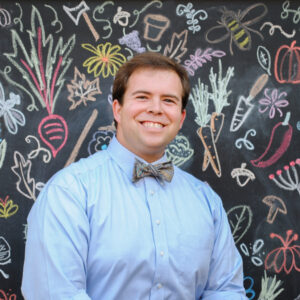 Jared Barnes, Ph.D., started gardening when he was five years old, and since then he has enthusiastically pursued how to best cultivate plants and cultivate minds. He currently fulfills those passions as an award-winning associate professor of horticulture at Stephen F. Austin State University in Nacogdoches, TX. He is also the host of The Plantastic Podcast, and writes a weekly newsletter titled plant•ed.
Jared Barnes, Ph.D., started gardening when he was five years old, and since then he has enthusiastically pursued how to best cultivate plants and cultivate minds. He currently fulfills those passions as an award-winning associate professor of horticulture at Stephen F. Austin State University in Nacogdoches, TX. He is also the host of The Plantastic Podcast, and writes a weekly newsletter titled plant•ed.
He obtained his Ph.D. in horticultural science from North Carolina State University in Raleigh, NC; he interned the summer of 2008 at The Scott Arboretum of Swarthmore College in Swarthmore, PA; and he has traveled around the US and into eleven countries to gain a national and global perspective of horticulture.
Recent awards include the 2021 Stephen F. Austin State University Teaching Excellence Award, 2019 Perennial Plant Association’s Academic Award, the 2017 Keep Nacogdoches Beautiful Sustainability Award, the 2016 Perennial Plant Association’s Young Professional of the Year, and a member of GPN’s 2016 Class of 40 Under 40.
His passion has been recognized by peers in interviews in People, Organic Gardening, Greenhouse Grower, AmericanHort Connect, Ken Druse’s Real Dirt, and Nursery Management, and his articles have appeared in The American Gardener, Fine Gardening and Carolina Gardener
 Trevor Smith, You Me and Climate Change
Trevor Smith, You Me and Climate Change
Trevor Smith is Design and Education Manager at Weston Nurseries in Massachusetts. He holds several landscape certifications and is a past President and a current Trustee of the Ecological Landscape Alliance. He is an award-winning regenerative landscape designer, specializing in green infrastructure, native plant design, habitat creation, and implementation of ecological design principles. He is passionate about the natural world which inspires his commitment to sustainable landscaping practices in an era of climate change
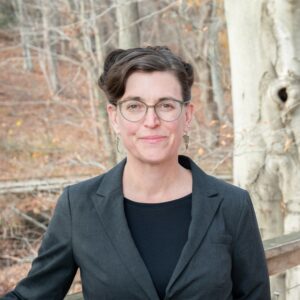
Lea Johnson, Stewardship Science: Integrating Research and Adaptive Management to Benefit People and Nature
Lea Johnson is Associate Director of Land Stewardship and Ecology in the Division of Science at Longwood Gardens, where she directs a multidisciplinary team to advance science-driven land stewardship in a variety of temperate habitat types including forests, meadows, wetlands, and agricultural lands. Dr. Johnson is a broadly trained ecologist with expertise in plant communities, urban ecosystems, and ecological restoration who joins basic research with applications to land management and design. Her research fosters collaborations across disciplines to understand the ecology of environments changed by people, and to advance science underpinning successful interventions to improve ecosystem health and functions in a changing world. She is interested in processes that unfold over time at multiple spatial and temporal scales, and she has worked in ecosystems of the U.S. Southwest, Pacific Northwest, and the Mid-Atlantic states. She is an affiliate faculty member of the Plant Science Graduate Program of the University of Maryland Department of Plant Science and Landscape Architecture.
 Paul Bogard, Is It the End of Night?
Paul Bogard, Is It the End of Night?
Paul Bogard is the author of The End of Night: Searching for Natural Darkness in an Age of Artificial Light, a finalist for the PEN/E. O. Wilson Literary Science Writing Award. His most recent works include the edited anthology Solastalgia: An Anthology of Emotion in a Disappearing World, the coffee table book To Know a Starry Night, and the children’s book What if Night? Paul is an associate professor of English at Hamline University in Saint Paul, Minnesota USA, where he teaches environmental literature and writing. Find him at paul-bogard.com.
Fran Chismar (with Tom Knezick), Lessons Learned: Helpful Hints on your Journey into Native Plants
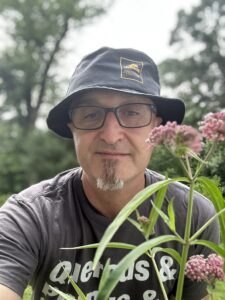 Meet Fran Chismar. Fran likes to talk – and with over 35 years of nursery industry experience, Fran has a lot to talk about. He insists he is not an expert on anything, but knows just enough about everything to be dangerous. Fran brings his experience with music podcasting, and joins it with his industry knowledge in restoration and native plants, to help guide you through Native Plants, Healthy Planet. Fran is currently the Sultan of Sales at Pinelands Nursery in Columbus, NJ.
Meet Fran Chismar. Fran likes to talk – and with over 35 years of nursery industry experience, Fran has a lot to talk about. He insists he is not an expert on anything, but knows just enough about everything to be dangerous. Fran brings his experience with music podcasting, and joins it with his industry knowledge in restoration and native plants, to help guide you through Native Plants, Healthy Planet. Fran is currently the Sultan of Sales at Pinelands Nursery in Columbus, NJ.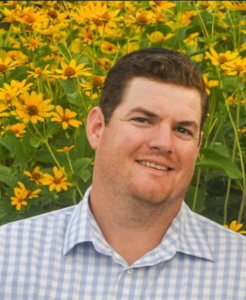
Tom Knezick (with Fran Chismar), Lessons Learned: Helpful Hints on your Journey into Native Plants
Meet Tom Knezick. Tom is naturally inquisitive but his role as production analyst requires him to pull things apart and figure out how and why they work. Coupling this with growing up on a native plant nursery and his love of podcasts is what makes Tom a natural host for Native Plants, Healthy Planet. Tom is currently General Manager at Pinelands Nursery in Columbus, NJ.
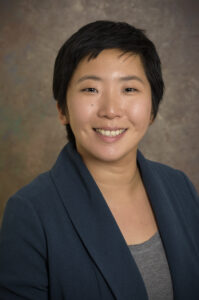
Tracy Qiu, De-centering the “Tree Museum”: Colonial Narratives in Environmental Conservation and Botanical Science
Tracy Qiu is a doctoral candidate at Concordia University (Montreal), where her thesis research explores how botanical gardens address their colonial origins while tackling contemporary issues of diversity and inclusion. Her interests in questions of access and “belonging” in botanical garden spaces have led her to deeply engage with public gardens and I.D.E.A. work, particularly in areas of racialized identities and decolonization. She has a multidisciplinary background in visual arts, ornamental horticulture, and critical race studies, and environmental humanities. In her spare time, she works as a facilitator and educator for public gardens looking to reconcile their inherited colonial histories with their complex modern identities in order to remain relevant, resilient, and connected.
Michelle Arevalos Franco, Working at the Scale of Labor: Practice and Pedagogy
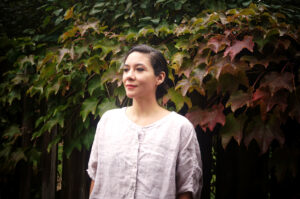 Michelle Arevalos Franco seeks to cultivate thriving ecological and social relations through the work of landscapes. Critical to this work is the interrogation of race, class, and knowledge stratification inherent to contemporary landscape architecture practice. Franco’s recent publications are informed by her Mexican roots and explore landscape architecture’s dependence on Latinx immigrant labor for construction and maintenance. This work is both academic and activist, calling for institutional and individual reforms within the discipline and illuminating landscape architecture’s complex political and social entanglements with immigration.
Michelle Arevalos Franco seeks to cultivate thriving ecological and social relations through the work of landscapes. Critical to this work is the interrogation of race, class, and knowledge stratification inherent to contemporary landscape architecture practice. Franco’s recent publications are informed by her Mexican roots and explore landscape architecture’s dependence on Latinx immigrant labor for construction and maintenance. This work is both academic and activist, calling for institutional and individual reforms within the discipline and illuminating landscape architecture’s complex political and social entanglements with immigration.
Franco’s pedagogy and practice clarify the emancipatory potential of collective landscape labor. She aims to re-value the physical work and embodied knowledge necessary to the creation of regenerative, sustainable futures. In her courses, students learn the importance of collective social relations and envision how to foster and sustain them. This landscape work, as commoning, is a bodily- and community-engaged alternative to patron-based models of landscape production. Deeply rooted in collectivity, interdependence, and egalitarian organization, these novel practices aim to mend social, racial, and ecological degradation resulting from capital-centric spatial production.
Franco is an assistant professor in landscape architecture at The Ohio State University and founder of Más Común. She was a landscape designer at Oehme, van Sweden & Associates in Washington, DC and holds a master’s degree in landscape architecture from Harvard’s Graduate School of Design, where she received the Peter Walker Partners Fellowship and the American Association of University Women’s Selected Professions Fellowship. Prior, Franco was program director of The Richard Avedon Foundation in New York and received a bachelor’s of fine art (magna cum laude) from the University of Arizona.
 Kathryn Deery, Gardening for the Seasons: Lessons from Lurie Garden
Kathryn Deery, Gardening for the Seasons: Lessons from Lurie Garden
Kathryn serves as Head Horticulturist of Lurie Garden and is passionate about the vital role public gardens play in communities. Her goal is to maintain the design integrity of Lurie Garden while facilitating the garden’s evolution. She aims to prioritize both the beauty and ecological function of Lurie Garden while maintaining a high standard of horticulture. Kathryn previously held positions in horticulture and public programming at the Chicago Botanic Garden. Additionally, she worked in habitat restoration with the Golden Gate Parks Conservancy and served as a Conservation Corps North Bay AmeriCorps member. Kathryn earned her Bachelor of Science degree in Environmental Science from the University of Michigan.
Richard McCoy, Electrification of the Workforce
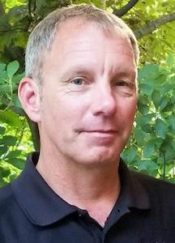 Richard McCoy is a 30-year green industry professional and owner of Richard A. McCoy Horticultural Services Inc. Established in 1998 as a conventional landscape company, McCoy Horticultural became one of New Jersey’s first completely organic, ecological, and low-impact land care companies in 2005. Currently, Richard and his team offer organic lawn and land care solutions, native plant, and green infrastructure design and installations. As well as complete off-grid battery electric landscape maintenance powered by a prototype self-designed 1.8 kHw solar trailer and autonomous robotic lawn mowing.
Richard McCoy is a 30-year green industry professional and owner of Richard A. McCoy Horticultural Services Inc. Established in 1998 as a conventional landscape company, McCoy Horticultural became one of New Jersey’s first completely organic, ecological, and low-impact land care companies in 2005. Currently, Richard and his team offer organic lawn and land care solutions, native plant, and green infrastructure design and installations. As well as complete off-grid battery electric landscape maintenance powered by a prototype self-designed 1.8 kHw solar trailer and autonomous robotic lawn mowing.
In addition to these business accomplishments, Richard is the Northeast representative for the American Green Zone Alliance, an active New Jersey Nursery and Landscape Association member, and a NOFA Accredited Land Care Professional.
Finally, Richard is an organic, ecological, and low-impact land care educator in all the above functions. He teaches contractors (and others) how to make the complicated transition to alternative land care methods, discussing technical fieldwork, marketing and customer relations, and the economics of this transition.
Richard’s other credentials include: Member of the Ecological Landscape Alliance Speakers Bureau; Co-author, The Rutgers Organic Land Care Best Management Practices Manual; Instructor for the Rutgers NJES Organic Land Care Certificate Program; Recognition by the Smithsonian Institute’s Archives of American Gardens; Member of The New Jersey Sustainable Business Registry; and recipient of the 2021 New Jersey Nursery and Landscape Association Horticulturalist of the Year, among others.
 Tim Boland, The Wildland Garden – How Challenging Conditions Led to a Resilient Natural Garden
Tim Boland, The Wildland Garden – How Challenging Conditions Led to a Resilient Natural Garden
Tim Boland is Executive Director of the Polly Hill Arboretum on Martha’s Vineyard where he guides programs in education, plant conservation, plant propagation and the development of a modern flora for Martha’s Vineyard. In 2006, Tim started the MV Wildtype native plant production program where locally grown plants are used for restoration projects or for homeowners hoping to create or enhance their gardens with native plants. Tim has a special interest in Oaks and serves on the board of directors of the International Oak Society as chair of the Oak Conservation and Research committee.

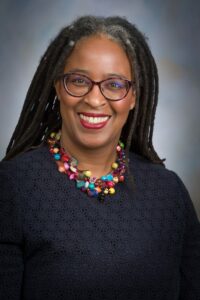 KEYNOTE: Camille Dungy,
KEYNOTE: Camille Dungy, 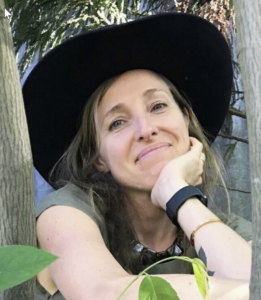 KEYNOTE: Rebecca McMackin,
KEYNOTE: Rebecca McMackin, 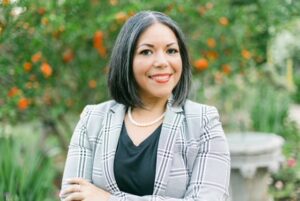 Jazmin Albarran,
Jazmin Albarran, 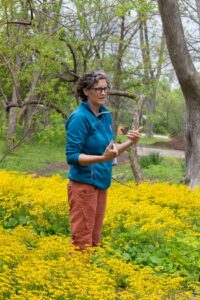 Kathleen Salisbury,
Kathleen Salisbury, 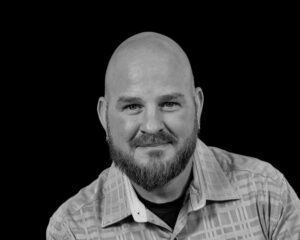 Trevor Smith,
Trevor Smith, 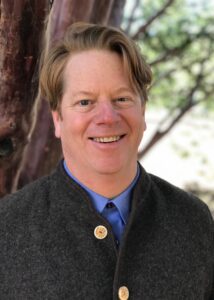 Paul Bogard,
Paul Bogard,  Kathryn Deery,
Kathryn Deery, 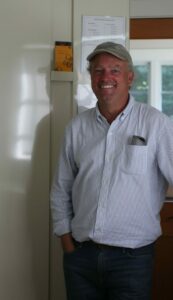 Tim Boland,
Tim Boland, 